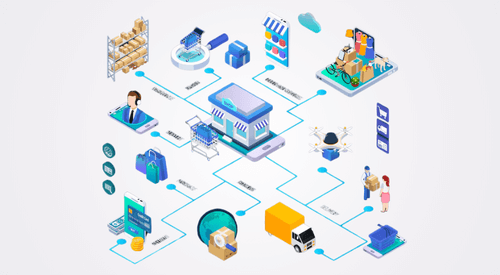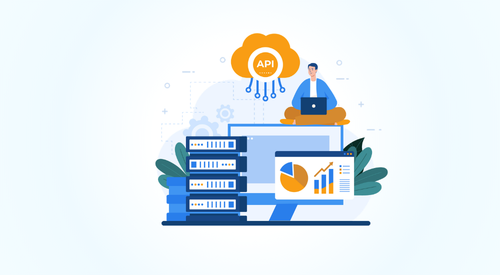

By 2025, 72% of organizations expect incorporating AI in supply chain management to become the primary factor distinguishing them from their competitors. Generative AI supply chain solutions have changed the business world despite its increasing complexity, challenges and nuances. Integrating generative AI in supply chain management brings innovative approaches for manufacturing and retail problems, ranging from volatile demand to unexpected disruptions, thereby keeping companies agile in an ever-competitive market.
Improve Supply Chain Operations with GenAI
Generative AI supply chain solutions are not just automation but dynamic strategies for logistics, risk management, inventory, and sustainability. This blog will discuss the new supply chain landscape with generative AI, offering practical examples and real-world applications showing how this technology can transform supply chains.
Understanding Generative AI for Supply Chain Management
Generative AI, a branch of artificial intelligence, enables the creation of adaptive solutions that go beyond predefined rules and processes. Supply chain solutions allow businesses to generate real-time strategies for managing disruptions, optimizing resources, and enhancing overall performance. Generative AI supply chain applications provide intelligent insights that can improve forecasting, manage inventory levels, and respond to risks efficiently.
The Data-Driven Backbone of Generative AI
Data is at the heart of generative AI supply chain models. GenAI utilizes historical data, market trends, and real-time information to generate adaptive solutions. These solutions can help businesses make better decisions in areas such as planning, inventory management, risk, and others.
Generative AI Potential in Efficiency Improvement
With generative AI comes the possibilities of handling bottlenecks, predicting shifts in the market, and unlocking efficiencies that better the end-to-end operations within a company. With such optimization, the supply chain workflows can be achieved through proactive solutions, either with dynamic demand forecasting or enhanced risk management, cutting-edge through generative AI solutions.
Generative AI Supply Chain Use Cases
Generative AI offers multiple transformative applications for supply chain management. Here are some of the generative AI supply chain use cases that are reshaping industries:
GenAI-Based Demand Models
An excellent example of AI application in the supply chain is when generative AI models generate adaptive demand forecasts based on history and market trends. This means that the business will always be ahead one step of the market fluctuations, and it will avoid the position of overproduction or stockouts.
Real-Time Adjustments to Forecasts
To make real-time updates of forecasts, Generative AI further makes it easier for any company to change its production plans quickly to react to new conditions, thus keeping its supply chain operations agile and responsive to market dynamics.
Fewer Stockouts and Overstocking
A good forecasting model reduces the occurrence of excess stock or stockouts by keeping optimal storage and reducing costs. The generative AI model helps create the perfect supply-demand balance, and their allocation is effective.
Risk Management and Disruption Mitigation
Risk management is at the heart of supply chain success, particularly in industries highly vulnerable to disruption, such as manufacturing and retail. Generative AI offers powerful solutions for predicting risks and identifying potential ones through contingency planning to hedge against them.
Scenario Planning for Risk Management
By implementing gen AI in the supply chain, companies can simulate various risk scenarios so that the responses to such disruptions become informed decisions. Supply chains, therefore, are ready for everything, from supplier delays to natural disasters.
Alternative Supplier Strategies
Generative AI can also discover alternative sources and propose new sourcing strategies when disruptions occur. In diversifying their supplier networks, businesses help establish continuity and ensure that disruption has minimal impact on their business operations.
Inventory and Resource Optimization
Another area where generative AI supply chain solutions can make a difference is inventory management. The ability to analyze data in AI models allows businesses to optimize inventory levels so that they have just the right amount at the right time.
GenAI-Based Resource Distribution
Through generative AI, the cost of waste can be minimized as much as possible while ensuring maximum efficiency through resource allocation strategies. One prominent AI in supply chain examples is how AI models set about optimal warehouse management, cutting down on understocking and overstocking simultaneously.
Improved Distribution Efficiency
Generative AI generates optimized distribution strategies to guarantee that products are distributed in the most efficient way possible, saving costs and ensuring customer satisfaction.
Predictive Maintenance for Resources
Another area in which generative AI benefits is the predictive maintenance mechanism of proactively maintaining machinery and other resources, such that reduced downtime reduces the chances of costly stoppage.
Generative AI for Sustainable Supply Chains
Sustainability is increasingly important in supply chain management, and generative AI supply chain solutions are pivotal in promoting eco-friendly practices. From reducing waste to optimizing energy use, generative AI is helping businesses meet their sustainability goals.
Waste Elimination through GenAI
The first and most apparent application of generative AI is waste elimination in supply chains. Generative AI can optimize production and logistic route schedules to reduce extra materials and reduce the environmental footprint of supply chain activities.
Energy Efficiency
Gen AI in supply chain management analyzes energy-use consumption patterns to provide method recommendations for reducing energy usage in the supply chain. Some of the method recommendations can be optimizing transportation routes to cut down on fuel consumption or adjusting production schedules to reduce the cost of energy.
Responsible Sourcing and Procurement
Generative AI can also help businesses find suppliers who align with their sustainability goals. This includes sourcing materials from eco-friendly suppliers and designing procurement strategies that reduce the aggregate environmental footprint of the supply chain.
Circular Economy Practices
Generative AI supports a circular economy by identifying recycling and reusing opportunities. Generative AI supply chain examples show how generative models can promote sustainable materials and elongate products’ life cycles.
Sustainable Logistics Solutions
By generating a logistics plan using AI, transportation emissions may be reduced through efficient delivery routes that help reduce fuel utilization. This saves costs but directly contributes to the corporate goal of sustainability.
Carbon Footprint Tracking
Generative AI enables firms to track and reduce the overall carbon footprint of the supply chain and, consequently, remain compliant with regulatory demands, which shows enthusiasm and conscious steps towards sustainability.
Conclusion: Generative AI Supply Chain as the Future of Operations
Businesses are facing increasing complexity in their supply chains, so generative AI supply chain solutions are becoming essential tools for optimizing operations, reducing costs, and enhancing sustainability. Generative AI’s ability to generate adaptive solutions in real-time sets it apart, making it an indispensable asset for companies looking to thrive in today’s dynamic business environment.
As supply chains become more complex, generative AI is essential for optimizing operations, reducing costs, and improving sustainability. Niveus Solutions’ have been consistently delivering cutting edge solutions for clients. Our Generative AI forecasting Chatbot solution for Maritime logistics, for example, enabled a client to achieve real-time, accurate demand forecasting, allowing them to streamline operations effectively.
For a leading postal service provider, Niveus deployed an AI chatbot that drastically improved response times, enhancing customer support efficiency and satisfaction.
The future of supply chain management lies in adopting generative AI supply chain technologies. Companies that embrace this innovation will be better equipped to manage disruptions, reduce environmental impact, and ensure long-term operational efficiency.











